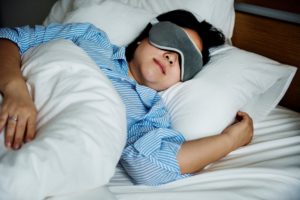When you buy through our links, we may earn a commission. Products or services may be offered by an affiliated entity. Learn more.
Vivid Dreams, Explained
If you’ve ever woken from a dream, feeling as if it were real and remembering every detail, you’ve had a vivid dream. Vivid dreams sometimes include pleasant or meaningful experiences, like soaring through the sky or conversing with a deceased loved one. They can also be nightmares marked by unpleasant or disturbing content, such as falling or being chased.
Looking to improve your sleep? Try upgrading your mattress.
What Are Vivid Dreams?
Vivid dreams are characterized by a sleeper’s ability to clearly recollect what they dreamed upon waking. While dreaming can occur any time you are asleep, most dreaming takes place during rapid eye movement (REM) sleep, the final of several sleep stages that your body cycles through roughly every 90 to 120 minutes, multiple times a night.
Over the course of the night, REM sleep happens for increasingly longer durations, with the final stint lasting as long as an hour. This means that you’re more likely to experience vivid dreams in your final hours of sleep—but this hinges on waking up. If you don’t wake during or immediately after a dream, you are unlikely to remember it.
What Causes Vivid Dreaming?
Vivid dreaming has been linked to a number of life circumstances, behaviors, and physical and mental health conditions.
- Sleep disruptions: Whether you are awoken by a snoring bed partner, a crying baby, or the symptoms of a medical condition like sleep apnea, you are more likely to remember your dreams if your sleep is disrupted, especially during REM sleep.
- Sleep deprivation: After a period of sleep deprivation, the body often compensates for lost sleep by entering REM sleep more often and at greater intensity than usual. This “REM rebound” increases the opportunity for vivid dreams to occur.
- Stress: Some experts think that dreams help people process negative emotions, which may explain why nightmares are more likely in times of stress. Stress also increases levels of the hormone cortisol, which has been linked to dream recall.
- Trauma: People with post-traumatic stress disorder (PTSD) may experience nightmares related to traumatic events throughout the sleep cycle, including while falling asleep.
- Bereavement: People who have experienced the loss of a loved one often report having vivid dreams of the deceased.
- Mental health conditions: Frequent, intense nightmares can accompany a variety of mental health conditions, including depression, anxiety, and schizophrenia.
- Medications: Some medications, particularly antidepressants, appear to generate nightmares. Similarly, withdrawal from certain medications can produce vivid dreams.
- Melatonin: Some people report experiencing vivid dreams when taking melatonin supplements. Nightmares are a symptom associated with taking too much melatonin.
- Pregnancy: Physical and hormonal changes that occur during pregnancy can cause insomnia and sleep disturbances. Sleep disruptions caused by nightmares are particularly common in the third trimester of pregnancy.
Why Are My Vivid Dreams So… Weird?
Scientists aren’t entirely sure why people dream, but experts hypothesize that dreaming helps people manage the emotions generated by what is going on in their lives—especially when those emotions are intense.
Vivid dreams can feature imagery that is strange or even disturbing, and some experts believe such dreams offer metaphorical representations of real-life experiences and emotions. Dental irritation or teeth grinding might lead to dreams of teeth falling out, and feelings of distress may generate dreams of being smothered.
While the content of vivid dreams may seem weird, the experience of having vivid dreams is relatively common. Nightmares, in particular, are prevalent in childhood, and most adults occasionally have them throughout their lives.
Are Vivid Dreams a Sign of Mental Illness?
Having vivid dreams every now and then—especially in times of high stress or emotional upheaval—is nothing to worry about. However, mental health does play a role in dream creation, and frequent vivid dreams might be a symptom of a mental health condition.
Talk to your doctor or a mental health professional if you experience:
- Multiple distressing nightmares every week
- Vivid dreams that regularly occur while you are falling asleep
- Recurring nightmares that feature a traumatic event from your past
- Hallucinations while you are awake
Do Vivid Dreams Have Meaning?
Dream interpretation is subjective, but many people find meaning in remembering and analyzing their dreams. Dreams can provide a space for problem solving and creativity, and they also can promote outside-the-box thinking. A number of important inventions, discoveries, and works of art have been attributed to dreams.
Dreams may also have a therapeutic role to play for some people. Many individuals who have lost a loved one report experiencing greater acceptance and comfort after encountering the person they lost in a vivid dream.If you’re interested in recording and reflecting on your dreams, consider keeping a dream journal and writing down your dreams as soon as you wake up.
How to Stop Vivid Dreams in Their Tracks
Some people find vivid dreams disturbing and would prefer not to have them. While you can’t prevent dreaming, you can take steps to improve the content of your dreams and to limit sleep disturbances that cause you to wake in the midst of them.
- Maintain a consistent sleep schedule: Going to bed and getting up at the same time every day is an important part of sleep hygiene that helps prevent sleep deprivation and may discourage vivid dreams caused by REM rebound.
- Reduce stress: Take steps to limit stress by exercising regularly, practicing relaxation techniques, and seeking support from friends and family.
- Relax before bed: Commit to a bedtime routine with relaxing activities, like taking a warm bath or listening to soothing music. In the hours before bed, avoid books, shows, and video games with potentially disturbing content.
- Seek therapy: Talk therapy can help treat persistent stress, as well as many mental health conditions associated with vivid dreams.
- Manage sleep disorders: If you experience sleep disorders such as sleep apnea, restless legs syndrome, or insomnia, talk to a medical professional about how to manage symptoms so you are less likely to experience sleep disruptions.
Talk to your doctor if vivid dreams regularly prevent you from getting the sleep you need or from functioning well in the daytime.

Still have questions? Ask our community!
Join our Sleep Care Community — a trusted hub of product specialists, sleep health professionals, and people just like you. Whether you’re searching for the perfect mattress or need expert sleep advice, we’ve got you covered. Get personalized guidance from the experts who know sleep best.
References
4 Sources
-
Zak, R. & Karippot, A. (2024 January). Nightmares and nightmare disorder in adults. In A. Avidan, A. Eichler, & M. Friedman (Ed.). UpToDate.
https://www.uptodate.com/contents/nightmares-and-nightmare-disorder-in-adults -
Schwab, R. (2022 August). Dream Myths with Dr. Richard Schwab. Merck Manuals Medical Myths. Merck Manual Professional Version.
https://www.merckmanuals.com/en-pr/professional/news/editorial/2022/08/16/21/46/podcast-dream-myths-with-dr-richard-schwab -
Feriante, J. & Singh, S. (2023 October). REM Rebound Effect. StatPearls.
https://www.ncbi.nlm.nih.gov/books/NBK560713/ -
Triantafyllou, A. S., Ilias, I., Economou, N. T., Pappa, A., Koukkou, E., & Steiropoulos, P. (2022). Dream Recall/Affect and Cortisol: An Exploratory Study. Clocks & sleep, 4(1), 9–15.
https://pubmed.ncbi.nlm.nih.gov/35225949/



















